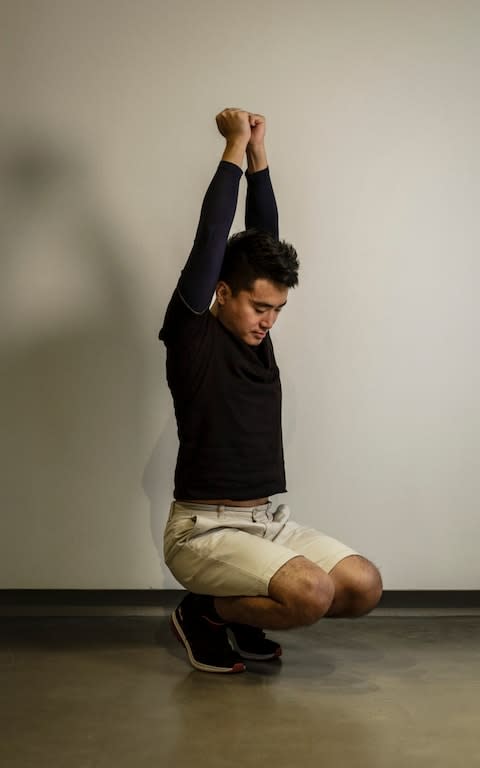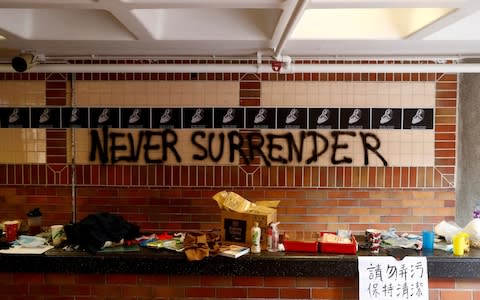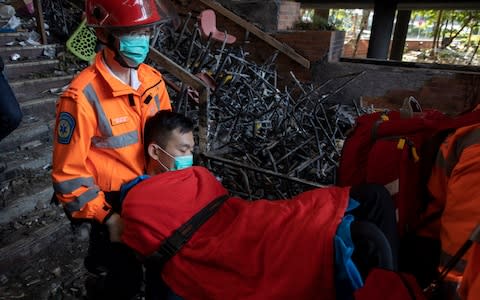UK to grant visa to Hong Kong consulate worker tortured in China

An employee of the UK consulate in Hong Kong who was tortured by Chinese authorities will be granted a visa to rebuild his life in Britain, it emerged on Wednesday as senior Conservatives urged Boris Johnson to extend similar freedoms to all UK nationals in the former colony.
The move came as China on Wednesday warned London that continuing to interfere in Hong Kong and China's internal affairs "will only harm the UK’s interests."
“China firmly objects to the UK’s comments related to the matter, and we express strong indignation toward the UK’s false actions and comments on all issues relating to Hong Kong," Geng Shuang, a foreign ministry spokesman, said in Beijing.
Earlier Dominic Raab, the foreign secretary, summoned the Chinese ambassador in the UK “to express our outrage at the brutal and disgraceful treatment" of Simon Cheng, who was chained, beaten, and forced into stress positions during a two-week long ordeal.
Ambassador Liu Xiaoming told the British government that Mr Cheng was detained for disturbing public order and that he "confessed all his offences and all his lawful rights and interests were guaranteed in accordance with the law," according to an embassy spokesperson.

Mr Cheng, a 29-year-old employee at the British consulate in Hong Kong, disappeared in China in August and was subjected to torture and interrogation sessions lasting as long as 48 hours, he told the Telegraph.
One officer terrorised him by saying he’d never be released. Another called him an enemy of the state
Chinese state security agents threatened to charge him with subversion and espionage if he failed to admit that the UK government was supporting the protests by providing funding and materials.
While Chinese police say he confessed to soliciting prostitution, punishable by 15 days’ detention, Mr Cheng continues to deny the charge, telling the Telegraph he was coerced into saying so as a condition of release.
Amnesty International said Mr Cheng’s account of his treatment fits with a “documented pattern of torture” in Chinese jails.

Mr Cheng is one of about 800,000 Hong Kong residents who are British Nationals Overseas, which entitles them to a passport and consular assistance but no right to abode in the UK.
The government has so far resisted calls to grant full citizenship to BNO passport holders, a move that would further aggravate China.

But in a joint letter to the prime minister on Wednesday Tory grandees including Lord Tebbit described the limited rights that come with BNO status as a “historic error” and said Britain had a responsibility to make it easier to move to the UK.
“With the Chinese President Xi Jinping threatening to crackdown, and the Hong Kong Police Force acting with impunity, the one county, two systems settlement is on the brink.”
“By increasing the rights of BNO passport holders, we can not only correct this historic error, but also we can provide the support that these British nationals in Hong Kong vitally need at this sensitive time,” they wrote.
The Liberal Democrats on Wednesday said they would change the law to allow BNO passport holder to live in the UK and reopen the scheme to fresh applications if they won the election on December 12.
Tom Tugenhadt, the Conservative MP who chairs the Foreign Affairs Select Committee, argued in this newspaper in June that BNO passport holders should be extended the same rights as full citizens.
Others called on the government to follow the United States in imposing targeted sanctions on China. The US Senate unanimously passed two bills aimed at protecting human rights in Hong Kong on Tuesday.
One piece of legislation would require Washington to certify annually whether Hong Kong’s autonomy was sufficient to continue special considerations that boosts its status as a global financial hub, and allow for sanctions against officials responsible for human rights violations.
A second bill would ban the export of crowd-control gear to Hong Kong, such as tear gas, pepper spray, rubber bullets and stun guns.

The UK banned exports of riot control gear to Hong Kong in June.
China on Wednesday warned London to remain “prudent and stop interfering in Hong Kong affairs and China’s domestic affairs, because that will only harm the UK’s interests,” said foreign ministry spokesman Geng Shuang.
Tensions between Britain and China have been mounting since massive pro-democracy demonstrations broke out in Hong Kong in June.
The protests, which began in response to a controversial plan to allow the extradition of criminal suspects to mainland China, pose a major challenge to the authority of the ruling Chinese Communist Party.
Schools in Hong Kong reopened on Wednesday on a day of relative calm, after being closed for nearly a week amidst unprecedented violence as demonstrators threw petrol bombs and shot fire-dipped arrows, and police fired tear gas and rubber bullets in response.
A multi-day siege at a university campus has stretched on, as a remaining group of protesters refuse to surrender to police.

 Yahoo News
Yahoo News 
